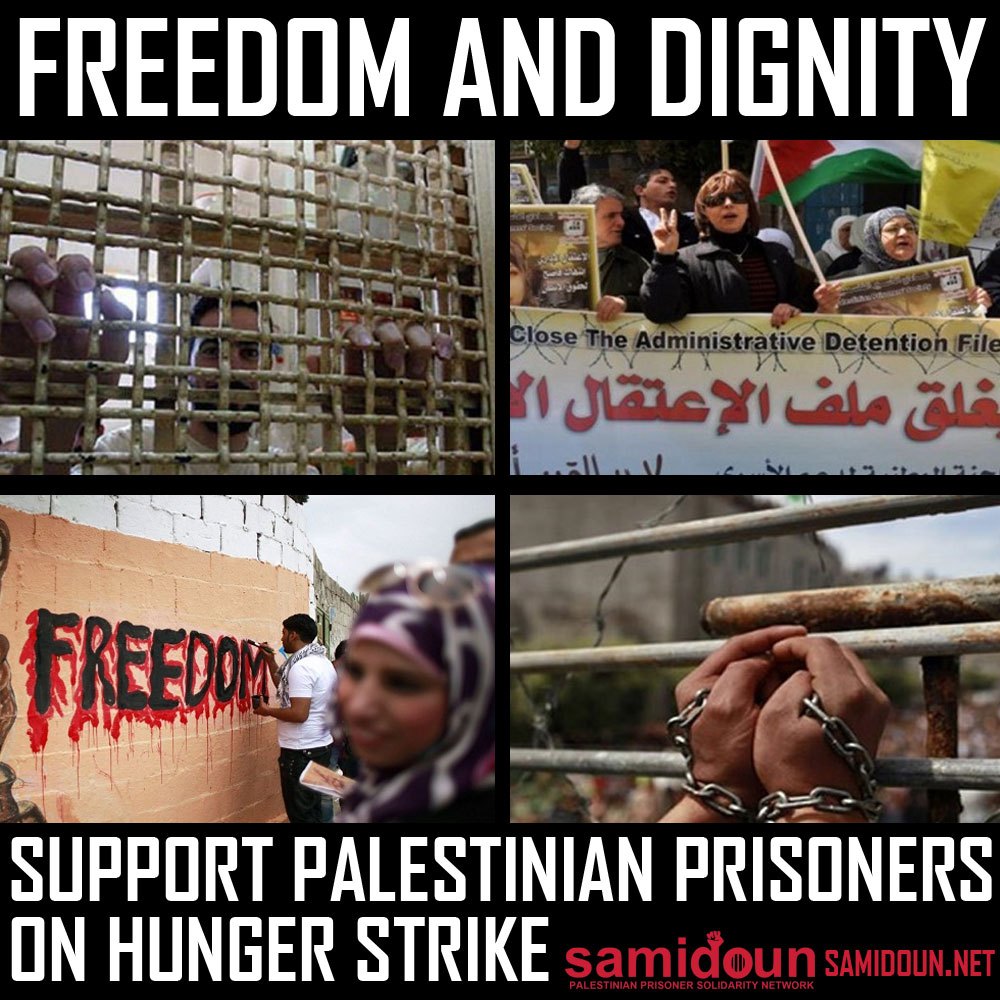
Over 1,500 Palestinian political prisoners have announced they will launch a collective hunger strike today, Monday, 17 April, on Palestinian Prisoners’ Day 2017. The strike, which will come under the slogan “Freedom and Dignity,” highlights a number of key demands of the Palestinian prisoners, including family visits, appropriate medical care, ending abusive conditions and stopping the use of solitary confinement and administrative detention, imprisonment without charge or trial. As the strike begins, Samidoun Palestinian Prisoner Solidarity Network urges supporters of justice around the world to take action to support the Palestinian prisoners whose bodies and lives are on the line for freedom and dignity.
Palestinian prisoners from across political lines announced they would participate in and support the strike, especially in Hadarim, Gilboa, and Nafha prisons. Prisoners in Beersheva, Ashkelon and Ramon prisons will also launch their participation in the strike today, with more to come in the future, Ma’an News reported. The strike’s demands were announced by Fateh prisoners with imprisoned Fateh Central Committee member and prominent political leader Marwan Barghouthi serving as the spokesperson for the strike. A statement by Barghouthi highlighting the strike’s causes was published in the New York Times on 16 April.
“Israel’s prisons have become the cradle of a lasting movement for Palestinian self-determination. This new hunger strike will demonstrate once more that the prisoners’ movement is the compass that guides our struggle, the struggle for Freedom and Dignity, the name we have chosen for this new step in our long walk to freedom,” wrote Barghouthi.
Israeli Minister of Public Security Gilad Erdan, known for his denunciation of hunger strikers as “terrorists,” has threatened to move all Palestinian prisoners on hunger strike to the Negev desert prison and establish a “field hospital” to deny the prisoners access to medical care in civilian hospitals – and potentially threaten them with force feeding. Indeed, the Israeli Prison Service announced “punitive measures” against 700 Palestinian prisoners who began the open hunger strike on the evening of 16 April, declaring that “the strike and other protest activities are illegal and will be dealt with firmly.”
As the strike begins, Israeli jails hold approximately 6,500 Palestinian political prisoners. This number includes nearly 60 women and 300 children. Nearly 600 are imprisoned without charge or trial under administrative detention, while over 1,000 are sick and require medical treatment.
This is the largest collective hunger strike of Palestinian prisoners since 2012 and before that, 2004, when mass hunger strikes united thousands of Palestinian prisoners for key demands, many of which were achieved in those strikes yet have come under repeated and sustained attack. There is a lengthy history of collective hunger strikes in Israeli jails organized by the Palestinian prisoners’ movement, stretching back decades.
While the strike was announced by Fateh prisoners with Barghouthi as their spokesperson, prisoners from the Popular Front for the Liberation of Palestine, Islamic Jihad, the Democratic Front for the Liberation of Palestine, Hamas, the People’s Party and others have declared participation in the strike, especially in prisons like Hadarim, Gilboa and Nafha, where there is nearly unanimous participation in the strike among political prisoners. Perhaps the last mass strike which saw such broad participation was the 2014 administrative detainees’ hunger strike which involved all of those Palestinians held without charge or trial – at the time, a number below 200.
In Barghouthi’s piece, he urged international solidarity, noting the support of South African former prisoners of the anti-apartheid struggle for Palestinian prisoners. “Israel is not the first occupying or colonial power to resort to such expedients. Every national liberation movement in history can recall similar practices. This is why so many people who have fought against oppression, colonialism and apartheid stand with us.” Fateh prisoners also emphasized the importance of support for the strike, noting that it was “urgent” that their cause becomes an Arab and an international one, instead of only being supported on the local and national level.
The Prison Branch of the PFLP also highlighted the importance of Palestinian support and international solidarity: “we call on all the Palestinian people and their supporters and friends around the world to stand side by side with the prisoners in their continuing battles inside the prisons, escalating the mass movement to support the battle of wills, challenge and confrontation, and to once again reaffirm the centrality of the cause of the prisoners.”
As 1,500 Palestinian political prisoners launch their hunger strike, we urge all supporters of Palestinian prisoners and the Palestinian people to urgently take action and join in the campaign of solidarity to achieve their demands.
Take action:
1) Organize or join an event as part of the Week of Action for Palestinian Prisoners’ Day in support of the hunger strikers. Protest outside your local Israeli embassy, consulate or mission, or at a public square or government building. You can drop a banner or put up a table to support the prisoners and their strike. See the list of current international events here, and add your own: http://samidoun.net/2017/04/schedule-of-events-actions-around-the-world-for-palestinian-prisoners-day-2017-week-of-action/
2) Join the social media campaign to support Palestinian prisoners. Take a picture of yourself or send a graphic with the hashtags below. Post on your own Facebook, Twitter, Instagram and share with the Facebook event: https://www.facebook.com/events/225669854578279/ Slogans via Addameer:
Palestinian Human Rights Defenders are #NotATarget #PalestinianPrisonersDay
Palestinian children are #NotATarget #PalestinianPrisonersDay
Stop Administrative Detention #StopAD
Freedom for Palestinian Political Prisoners #April17 #PrisonersDay
I stand in solidarity with Palestinian Political Prisoners #PrisonersDay
3) Write letters and make phone calls to protest the violation of the rights of Palestinian political prisoners and urge your government officials to pressure Israel to accept the demands of the Palestinian political prisoners.
4) Boycott, Divest and Sanction. Join the BDS Movement to highlight the complicity of corporations like Hewlett-Packard and the continuing involvement of G4S in Israeli policing and prisons. Build a campaign to boycott Israeli goods, impose a military embargo on Israel, or organize around the academic and cultural boycott of Israel.
Materials to support your events and organizing are available for download here:http://samidoun.net/2017/03/call-to-organize-palestinian-prisoners-week-of-action-14-to-24-april-2017/ Please contact samidoun@samidoun.net or reach out to us on Facebook for questions or to share your actions.
Demands of the Strikers
The demands of the strike:
1) Installation of a public telephone in each prison and section for Palestinian prisoners to communicate with their loved ones.
2) Family Visits
A) Resume the second monthly visit, which was cut by the International Committee of the Red Cross
B) Regular visits every two weeks without cancellation or interference
C) No prevention of visits by relatives of the “first and second class”
D) Increase the duration of visits from 45 minutes to 1 1/2 hours
E) Allow photography with parents every three months
F) Facilities for the comfort of prisoners’ parents at the prison entrance
G) Children and grandchildren under the age of 16 allowed visitation at each visit
3) Medical Care
A) Close the so-called “Ramle prison hospital,” as it is unfit for necessary treatment
B) End of the policy of medical neglect against prisoners
C) Regular, scheduled periodic medical examinations
D) Surgical procedures received quickly and without delay
E) Introduction of specialist doctors from outside the prison system
F) Release of sick prisoners, especially those with disabilities and terminal illnesses
G) No transfer of the cost of treatment to prisoners and their families
4) Respond to the needs and demands of the Palestinian women prisoners for private transportation and direct visits with their family members without barriers
5) “Bosta” and Transportation
A) Secure the humane treatment of prisoners during transportation and movement
B) Prisoners must be returned to prisons, clinics and courts and not kept at crossing points for lengthy periods.
C) Rehabilitation of these crossing points to make them fit for human use, including providing meals
6) Access to satellite channels tailored to the needs of prisoners
7) Installation of a cooling system in prisons, especially Megiddo and Gilboa
8) Reform kitchens for all prisons and put them entirely under the supervision of Palestinian prisoners
9) Introduction of books, newspapers, clothing, food and other gifts for prisoners from their families during visits
10) Ending the policy of solitary confinement
11) Ending the policy of administrative detention
12) Re-introducing access to education via the Open Hebrew University
13) Allow the prisoners to provide high school (tawjihi) examinations under officially agreed-upon guidelines




